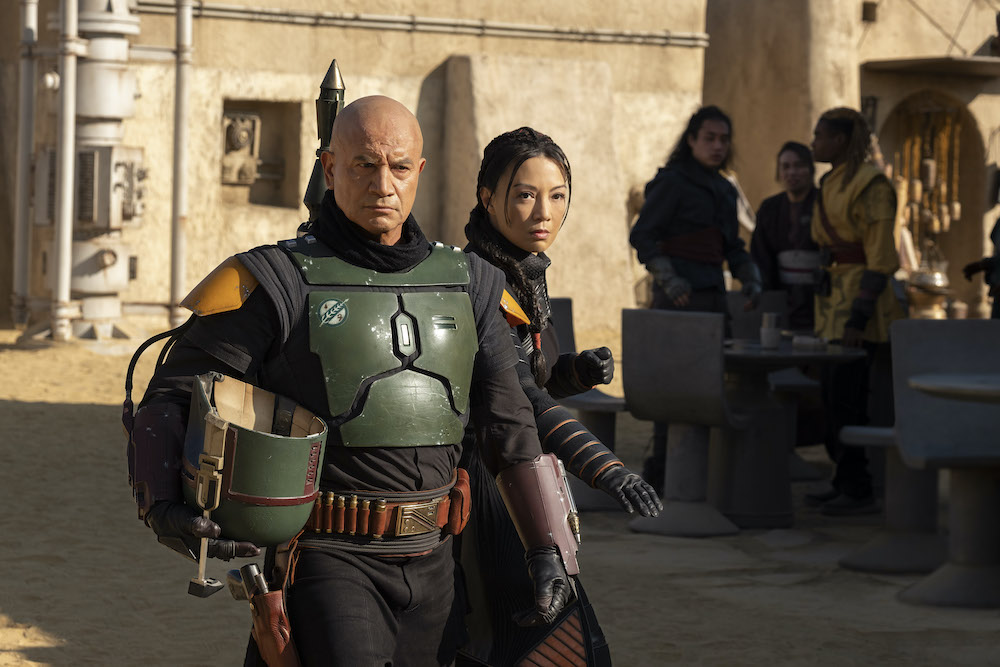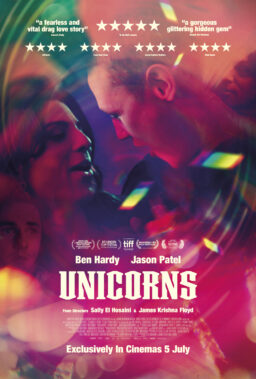Everyone’s favorite bounty hunter from the original three “Star Wars” films gets his own series, and his own massive redemption arc, in the heavily anticipated new series “The Book of Boba Fett.” We were re-introduced to this character in the last season of “The Mandalorian,” after having gone years without knowing whether the classic bad-ass survived the Sarlacc pit in “The Return of the Jedi.” It was a true thrill to see him again (and made for a great episode by director Robert Rodriguez); it was even more exciting that the end of “The Mandalorian” introduced a Boba Fett show in which the bounty hunter takes over the throne of previous crime lord Jabba the Hutt.
With its first episode premiering on Disney+ today—a strong enough tease of what’s to come—“The Book of Boba Fett” seeks to fill in more of the backstory about the bounty hunter, including how he escaped the monstrous pit that swallowed him whole. It juxtaposes these dreams he has with the figure he is now, a gruff gangster with PTSD who rules with few words, and with the help of his partner Fennec Shand (Ming-Na Wen, who is more and more deserving of her own show). His ascent is essentially about rising in the “Star Wars” galaxy food chain, going from bounty hunter to Tusken Raider prisoner, and eventually using his chains for a display of power. These flashbacks do not just hint at what happened to him physically, but how they crystallized his concepts of power, and survival.

As it goes with watching only one episode, always, it’s too early to guess the overall quality, but you can see what one hopes gets more development in later chapters. In particular, Morrison’s character work needs a bit more to it, as the flashbacks and brief scenes of dialogue are more about simply establishing his identity from that of the past. And when he does talk as a ruler—cool, merciful, calculated—it’s not with any curious grandiosity for a new crime lord. It’s kind of monotonous. It will be interesting to see how Morrison creates more of an interior sense for this character, just as Pedro Pascal did. But any emotional connection in this episode doesn’t come from his work or line-reading; the flashbacks seem even more like a crutch.
One other questionable point—the action. Rodriguez had some very inspired fight sequences when he directed certain episodes of “The Mandalorian,” but the collection of brief monster rumbles, traps, and chases here leaves more to be desired. There’s one moment in which Boba Fett, Fennec Shand, and two recently hired Gamorreans are battling dudes who use lighting bolt sticks and shields as their weapons, and it often looks too stagey, too much like a “Power Rangers” episode. The pilot does get a little kick soon after when it brings in some parkour for a rooftop chase starring Fennec, but that excitement too also devolves into mild choreography and cinematography.
What’s most interesting about this series—as intended with its pacing that seems just as gradual as the “Mandalorian” pilot—is how it ponders how effective this former bounty hunter will be in power, with unconventional certain standards: he does not want to rule with fear, and his nobility will not have a pomp and circumstance to it, far different than Jabba the Hutt’s style. As we see in each game of words he has while on the throne, it’s a clearly dangerous approach to a role that many will try to take advantage of, or simply try to take. It’s his hard-earned inner philosophy, and the stakes that come from honoring it, that I imagine will make this reinvention the most intriguing as we get used to seeing Boba Fett every week.
First episode screened for review. “The Book of Boba Fett” premieres today on Disney+ and airs weekly.












